HNBS 311: Digital Technology Impact on Workplace Transformation
VerifiedAdded on 2023/06/09
|13
|2416
|256
Project
AI Summary
This research project investigates the impact of digital technology in accelerating workplace transformation during the COVID-19 pandemic, using Barker and Stonehouse as a case study. The study aims to analyze the impact of COVID-19 on workplace transformation, identify key transformations that occurred during the pandemic, assess the role of digital strategies in managing these transformations, and recommend best digital practices. The research employs a qualitative approach, utilizing both primary and secondary data collection methods, with a focus on non-random sampling of 50 Barker and Stonehouse employees. Thematic data analysis will be used to interpret the collected data, ensuring ethical considerations are addressed throughout the research process. The project includes a detailed timeline with milestones for proposal submission and project report submission.

Research Proposal Form
Student Name:
Student Number:
Centre Name:
Tutor:
Date:
Unit:HNBS 311
Proposed title:
Student Name:
Student Number:
Centre Name:
Tutor:
Date:
Unit:HNBS 311
Proposed title:
Paraphrase This Document
Need a fresh take? Get an instant paraphrase of this document with our AI Paraphraser
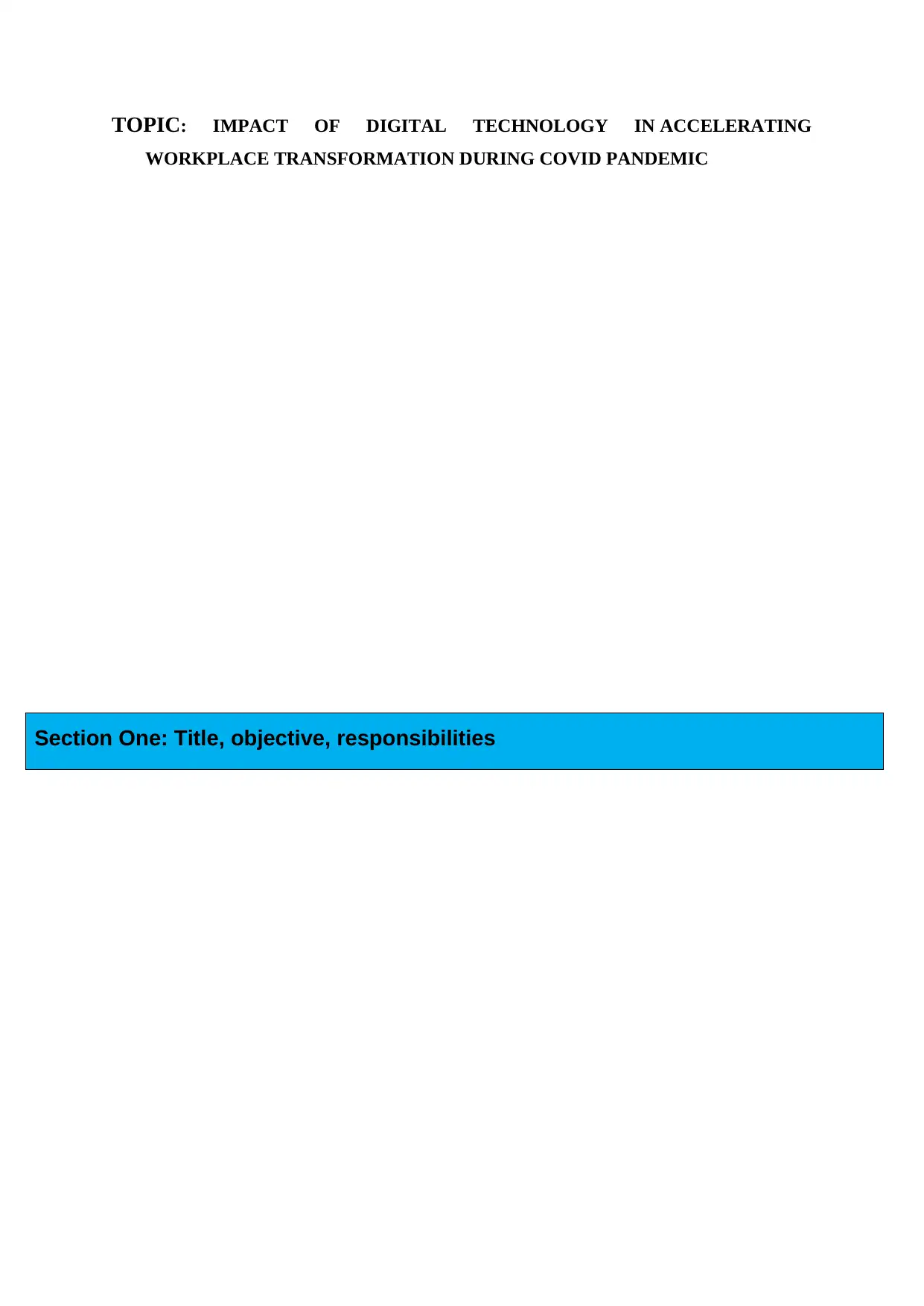
TOPIC: IMPACT OF DIGITAL TECHNOLOGY IN ACCELERATING
WORKPLACE TRANSFORMATION DURING COVID PANDEMIC
Section One: Title, objective, responsibilities
WORKPLACE TRANSFORMATION DURING COVID PANDEMIC
Section One: Title, objective, responsibilities
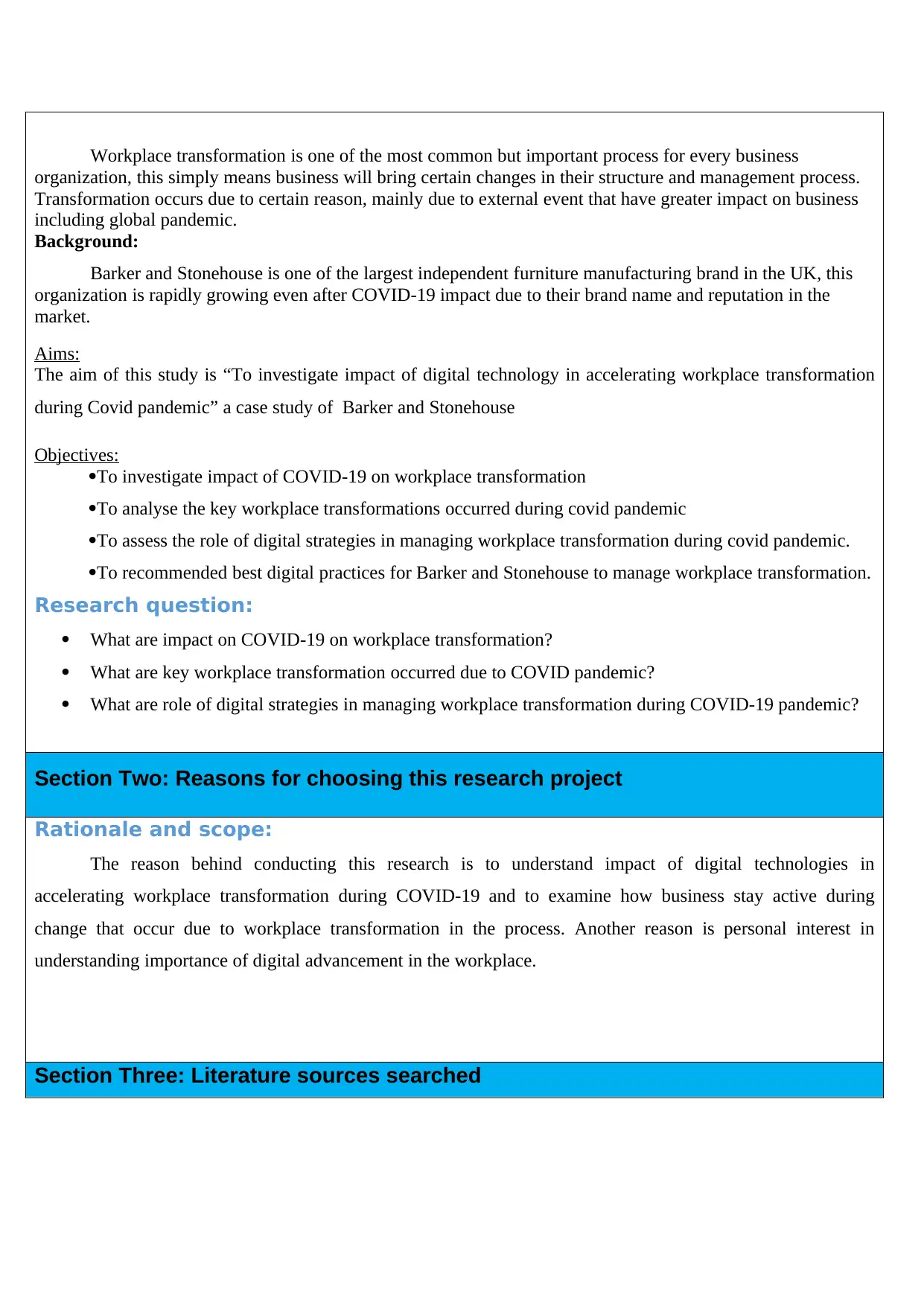
Workplace transformation is one of the most common but important process for every business
organization, this simply means business will bring certain changes in their structure and management process.
Transformation occurs due to certain reason, mainly due to external event that have greater impact on business
including global pandemic.
Background:
Barker and Stonehouse is one of the largest independent furniture manufacturing brand in the UK, this
organization is rapidly growing even after COVID-19 impact due to their brand name and reputation in the
market.
Aims:
The aim of this study is “To investigate impact of digital technology in accelerating workplace transformation
during Covid pandemic” a case study of Barker and Stonehouse
Objectives:
To investigate impact of COVID-19 on workplace transformation
To analyse the key workplace transformations occurred during covid pandemic
To assess the role of digital strategies in managing workplace transformation during covid pandemic.
To recommended best digital practices for Barker and Stonehouse to manage workplace transformation.
Research question:
What are impact on COVID-19 on workplace transformation?
What are key workplace transformation occurred due to COVID pandemic?
What are role of digital strategies in managing workplace transformation during COVID-19 pandemic?
Section Two: Reasons for choosing this research project
Rationale and scope:
The reason behind conducting this research is to understand impact of digital technologies in
accelerating workplace transformation during COVID-19 and to examine how business stay active during
change that occur due to workplace transformation in the process. Another reason is personal interest in
understanding importance of digital advancement in the workplace.
Section Three: Literature sources searched
organization, this simply means business will bring certain changes in their structure and management process.
Transformation occurs due to certain reason, mainly due to external event that have greater impact on business
including global pandemic.
Background:
Barker and Stonehouse is one of the largest independent furniture manufacturing brand in the UK, this
organization is rapidly growing even after COVID-19 impact due to their brand name and reputation in the
market.
Aims:
The aim of this study is “To investigate impact of digital technology in accelerating workplace transformation
during Covid pandemic” a case study of Barker and Stonehouse
Objectives:
To investigate impact of COVID-19 on workplace transformation
To analyse the key workplace transformations occurred during covid pandemic
To assess the role of digital strategies in managing workplace transformation during covid pandemic.
To recommended best digital practices for Barker and Stonehouse to manage workplace transformation.
Research question:
What are impact on COVID-19 on workplace transformation?
What are key workplace transformation occurred due to COVID pandemic?
What are role of digital strategies in managing workplace transformation during COVID-19 pandemic?
Section Two: Reasons for choosing this research project
Rationale and scope:
The reason behind conducting this research is to understand impact of digital technologies in
accelerating workplace transformation during COVID-19 and to examine how business stay active during
change that occur due to workplace transformation in the process. Another reason is personal interest in
understanding importance of digital advancement in the workplace.
Section Three: Literature sources searched
⊘ This is a preview!⊘
Do you want full access?
Subscribe today to unlock all pages.

Trusted by 1+ million students worldwide
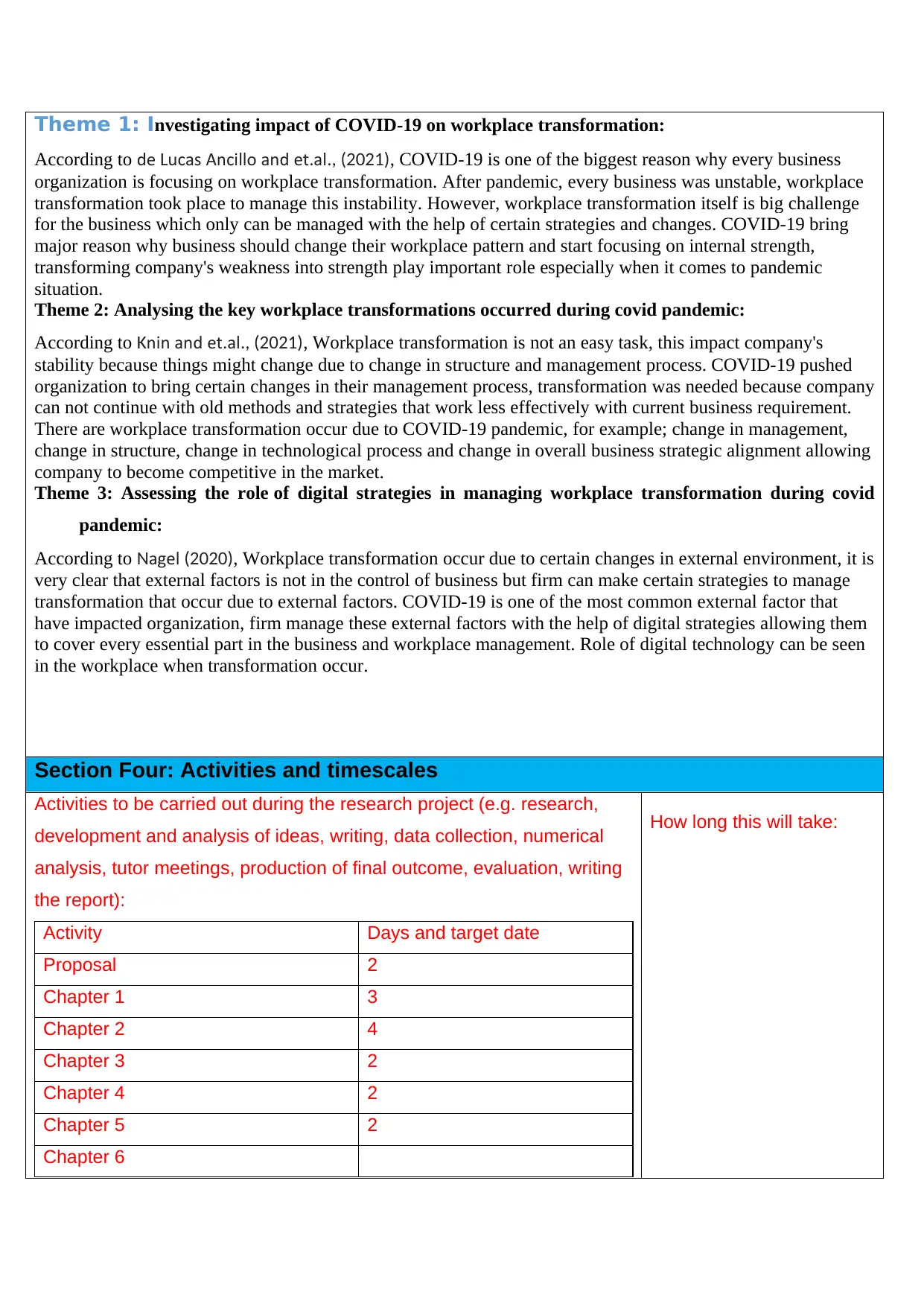
Theme 1: Investigating impact of COVID-19 on workplace transformation:
According to de ucas Ancillo and et alL . ., (2021), COVID-19 is one of the biggest reason why every business
organization is focusing on workplace transformation. After pandemic, every business was unstable, workplace
transformation took place to manage this instability. However, workplace transformation itself is big challenge
for the business which only can be managed with the help of certain strategies and changes. COVID-19 bring
major reason why business should change their workplace pattern and start focusing on internal strength,
transforming company's weakness into strength play important role especially when it comes to pandemic
situation.
Theme 2: Analysing the key workplace transformations occurred during covid pandemic:
According to niffin and et alK . ., (2021), Workplace transformation is not an easy task, this impact company's
stability because things might change due to change in structure and management process. COVID-19 pushed
organization to bring certain changes in their management process, transformation was needed because company
can not continue with old methods and strategies that work less effectively with current business requirement.
There are workplace transformation occur due to COVID-19 pandemic, for example; change in management,
change in structure, change in technological process and change in overall business strategic alignment allowing
company to become competitive in the market.
Theme 3: Assessing the role of digital strategies in managing workplace transformation during covid
pandemic:
According to agelN (2020), Workplace transformation occur due to certain changes in external environment, it is
very clear that external factors is not in the control of business but firm can make certain strategies to manage
transformation that occur due to external factors. COVID-19 is one of the most common external factor that
have impacted organization, firm manage these external factors with the help of digital strategies allowing them
to cover every essential part in the business and workplace management. Role of digital technology can be seen
in the workplace when transformation occur.
Section Four: Activities and timescales
Activities to be carried out during the research project (e.g. research,
development and analysis of ideas, writing, data collection, numerical
analysis, tutor meetings, production of final outcome, evaluation, writing
the report):
Activity Days and target date
Proposal 2
Chapter 1 3
Chapter 2 4
Chapter 3 2
Chapter 4 2
Chapter 5 2
Chapter 6
How long this will take:
According to de ucas Ancillo and et alL . ., (2021), COVID-19 is one of the biggest reason why every business
organization is focusing on workplace transformation. After pandemic, every business was unstable, workplace
transformation took place to manage this instability. However, workplace transformation itself is big challenge
for the business which only can be managed with the help of certain strategies and changes. COVID-19 bring
major reason why business should change their workplace pattern and start focusing on internal strength,
transforming company's weakness into strength play important role especially when it comes to pandemic
situation.
Theme 2: Analysing the key workplace transformations occurred during covid pandemic:
According to niffin and et alK . ., (2021), Workplace transformation is not an easy task, this impact company's
stability because things might change due to change in structure and management process. COVID-19 pushed
organization to bring certain changes in their management process, transformation was needed because company
can not continue with old methods and strategies that work less effectively with current business requirement.
There are workplace transformation occur due to COVID-19 pandemic, for example; change in management,
change in structure, change in technological process and change in overall business strategic alignment allowing
company to become competitive in the market.
Theme 3: Assessing the role of digital strategies in managing workplace transformation during covid
pandemic:
According to agelN (2020), Workplace transformation occur due to certain changes in external environment, it is
very clear that external factors is not in the control of business but firm can make certain strategies to manage
transformation that occur due to external factors. COVID-19 is one of the most common external factor that
have impacted organization, firm manage these external factors with the help of digital strategies allowing them
to cover every essential part in the business and workplace management. Role of digital technology can be seen
in the workplace when transformation occur.
Section Four: Activities and timescales
Activities to be carried out during the research project (e.g. research,
development and analysis of ideas, writing, data collection, numerical
analysis, tutor meetings, production of final outcome, evaluation, writing
the report):
Activity Days and target date
Proposal 2
Chapter 1 3
Chapter 2 4
Chapter 3 2
Chapter 4 2
Chapter 5 2
Chapter 6
How long this will take:
Paraphrase This Document
Need a fresh take? Get an instant paraphrase of this document with our AI Paraphraser

Milestone one: Submitting the Research Proposal
Target date (set by tutor): 13 June 2022
Milestone two: Submitting the Research Project Report
Target date (set by tutor): 25 July 2022
Section Five: Research approach and methodologies
Target date (set by tutor): 13 June 2022
Milestone two: Submitting the Research Project Report
Target date (set by tutor): 25 July 2022
Section Five: Research approach and methodologies
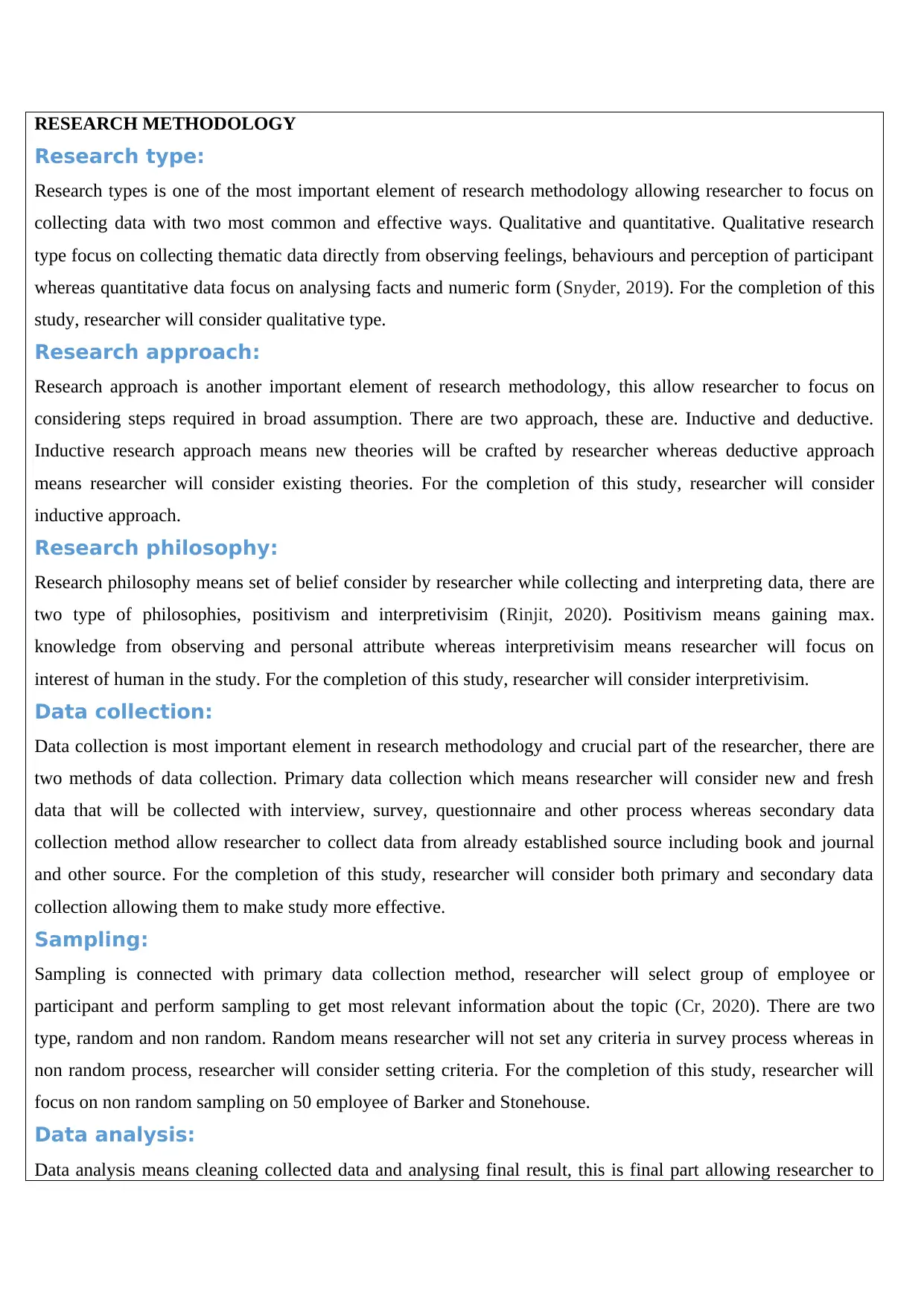
RESEARCH METHODOLOGY
Research type:
Research types is one of the most important element of research methodology allowing researcher to focus on
collecting data with two most common and effective ways. Qualitative and quantitative. Qualitative research
type focus on collecting thematic data directly from observing feelings, behaviours and perception of participant
whereas quantitative data focus on analysing facts and numeric form (Snyder, 2019). For the completion of this
study, researcher will consider qualitative type.
Research approach:
Research approach is another important element of research methodology, this allow researcher to focus on
considering steps required in broad assumption. There are two approach, these are. Inductive and deductive.
Inductive research approach means new theories will be crafted by researcher whereas deductive approach
means researcher will consider existing theories. For the completion of this study, researcher will consider
inductive approach.
Research philosophy:
Research philosophy means set of belief consider by researcher while collecting and interpreting data, there are
two type of philosophies, positivism and interpretivisim (Rinjit, 2020). Positivism means gaining max.
knowledge from observing and personal attribute whereas interpretivisim means researcher will focus on
interest of human in the study. For the completion of this study, researcher will consider interpretivisim.
Data collection:
Data collection is most important element in research methodology and crucial part of the researcher, there are
two methods of data collection. Primary data collection which means researcher will consider new and fresh
data that will be collected with interview, survey, questionnaire and other process whereas secondary data
collection method allow researcher to collect data from already established source including book and journal
and other source. For the completion of this study, researcher will consider both primary and secondary data
collection allowing them to make study more effective.
Sampling:
Sampling is connected with primary data collection method, researcher will select group of employee or
participant and perform sampling to get most relevant information about the topic (Cr, 2020). There are two
type, random and non random. Random means researcher will not set any criteria in survey process whereas in
non random process, researcher will consider setting criteria. For the completion of this study, researcher will
focus on non random sampling on 50 employee of Barker and Stonehouse.
Data analysis:
Data analysis means cleaning collected data and analysing final result, this is final part allowing researcher to
Research type:
Research types is one of the most important element of research methodology allowing researcher to focus on
collecting data with two most common and effective ways. Qualitative and quantitative. Qualitative research
type focus on collecting thematic data directly from observing feelings, behaviours and perception of participant
whereas quantitative data focus on analysing facts and numeric form (Snyder, 2019). For the completion of this
study, researcher will consider qualitative type.
Research approach:
Research approach is another important element of research methodology, this allow researcher to focus on
considering steps required in broad assumption. There are two approach, these are. Inductive and deductive.
Inductive research approach means new theories will be crafted by researcher whereas deductive approach
means researcher will consider existing theories. For the completion of this study, researcher will consider
inductive approach.
Research philosophy:
Research philosophy means set of belief consider by researcher while collecting and interpreting data, there are
two type of philosophies, positivism and interpretivisim (Rinjit, 2020). Positivism means gaining max.
knowledge from observing and personal attribute whereas interpretivisim means researcher will focus on
interest of human in the study. For the completion of this study, researcher will consider interpretivisim.
Data collection:
Data collection is most important element in research methodology and crucial part of the researcher, there are
two methods of data collection. Primary data collection which means researcher will consider new and fresh
data that will be collected with interview, survey, questionnaire and other process whereas secondary data
collection method allow researcher to collect data from already established source including book and journal
and other source. For the completion of this study, researcher will consider both primary and secondary data
collection allowing them to make study more effective.
Sampling:
Sampling is connected with primary data collection method, researcher will select group of employee or
participant and perform sampling to get most relevant information about the topic (Cr, 2020). There are two
type, random and non random. Random means researcher will not set any criteria in survey process whereas in
non random process, researcher will consider setting criteria. For the completion of this study, researcher will
focus on non random sampling on 50 employee of Barker and Stonehouse.
Data analysis:
Data analysis means cleaning collected data and analysing final result, this is final part allowing researcher to
⊘ This is a preview!⊘
Do you want full access?
Subscribe today to unlock all pages.

Trusted by 1+ million students worldwide
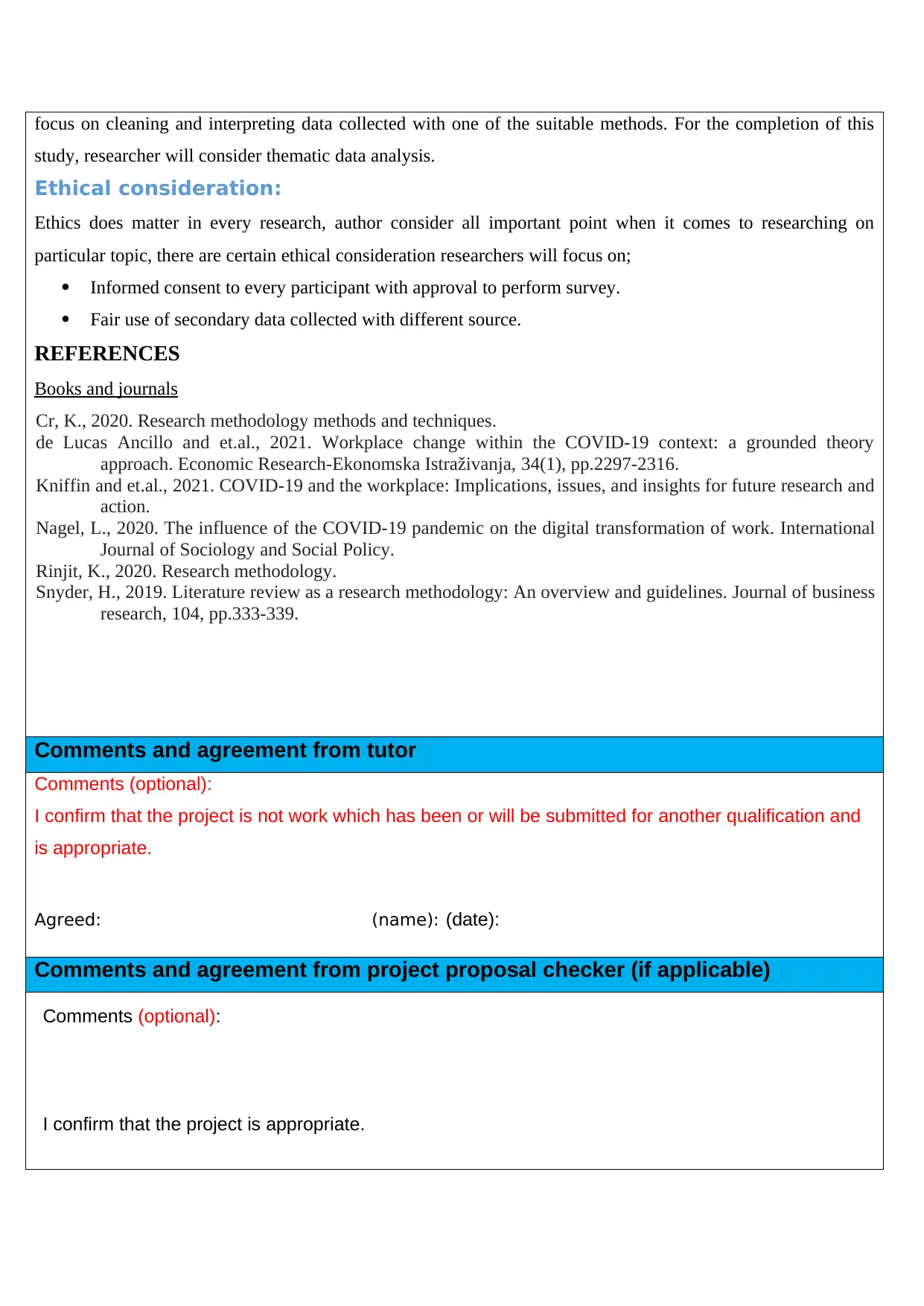
focus on cleaning and interpreting data collected with one of the suitable methods. For the completion of this
study, researcher will consider thematic data analysis.
Ethical consideration:
Ethics does matter in every research, author consider all important point when it comes to researching on
particular topic, there are certain ethical consideration researchers will focus on;
Informed consent to every participant with approval to perform survey.
Fair use of secondary data collected with different source.
REFERENCES
Books and journals
Cr, K., 2020. Research methodology methods and techniques.
de Lucas Ancillo and et.al., 2021. Workplace change within the COVID-19 context: a grounded theory
approach. Economic Research-Ekonomska Istraživanja, 34(1), pp.2297-2316.
Kniffin and et.al., 2021. COVID-19 and the workplace: Implications, issues, and insights for future research and
action.
Nagel, L., 2020. The influence of the COVID-19 pandemic on the digital transformation of work. International
Journal of Sociology and Social Policy.
Rinjit, K., 2020. Research methodology.
Snyder, H., 2019. Literature review as a research methodology: An overview and guidelines. Journal of business
research, 104, pp.333-339.
Comments and agreement from tutor
Comments (optional):
I confirm that the project is not work which has been or will be submitted for another qualification and
is appropriate.
Agreed: (name): (date):
Comments and agreement from project proposal checker (if applicable)
Comments (optional):
I confirm that the project is appropriate.
study, researcher will consider thematic data analysis.
Ethical consideration:
Ethics does matter in every research, author consider all important point when it comes to researching on
particular topic, there are certain ethical consideration researchers will focus on;
Informed consent to every participant with approval to perform survey.
Fair use of secondary data collected with different source.
REFERENCES
Books and journals
Cr, K., 2020. Research methodology methods and techniques.
de Lucas Ancillo and et.al., 2021. Workplace change within the COVID-19 context: a grounded theory
approach. Economic Research-Ekonomska Istraživanja, 34(1), pp.2297-2316.
Kniffin and et.al., 2021. COVID-19 and the workplace: Implications, issues, and insights for future research and
action.
Nagel, L., 2020. The influence of the COVID-19 pandemic on the digital transformation of work. International
Journal of Sociology and Social Policy.
Rinjit, K., 2020. Research methodology.
Snyder, H., 2019. Literature review as a research methodology: An overview and guidelines. Journal of business
research, 104, pp.333-339.
Comments and agreement from tutor
Comments (optional):
I confirm that the project is not work which has been or will be submitted for another qualification and
is appropriate.
Agreed: (name): (date):
Comments and agreement from project proposal checker (if applicable)
Comments (optional):
I confirm that the project is appropriate.
Paraphrase This Document
Need a fresh take? Get an instant paraphrase of this document with our AI Paraphraser
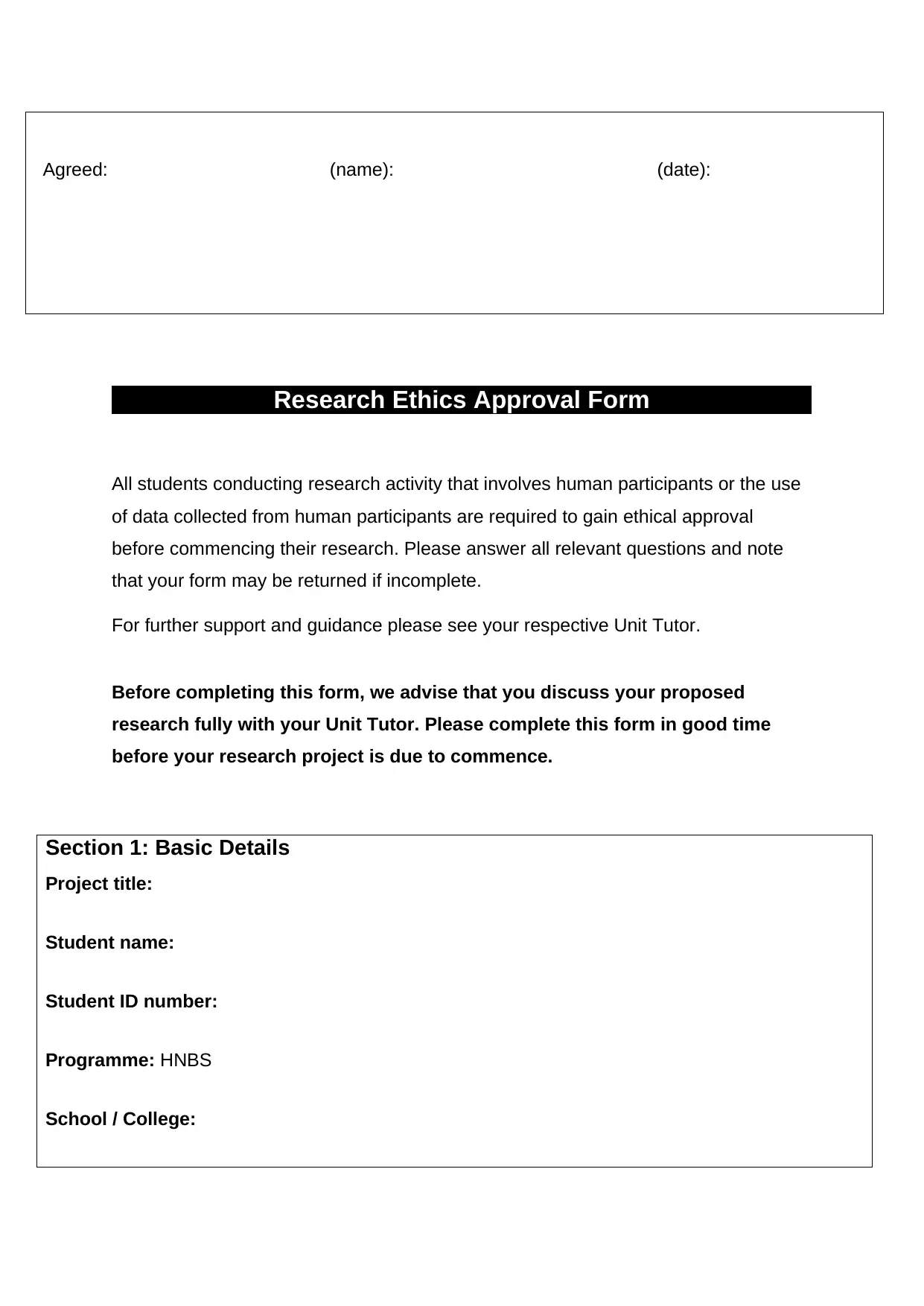
Agreed: (name): (date):
Research Ethics Approval Form
All students conducting research activity that involves human participants or the use
of data collected from human participants are required to gain ethical approval
before commencing their research. Please answer all relevant questions and note
that your form may be returned if incomplete.
For further support and guidance please see your respective Unit Tutor.
Before completing this form, we advise that you discuss your proposed
research fully with your Unit Tutor. Please complete this form in good time
before your research project is due to commence.
Section 1: Basic Details
Project title:
Student name:
Student ID number:
Programme: HNBS
School / College:
Research Ethics Approval Form
All students conducting research activity that involves human participants or the use
of data collected from human participants are required to gain ethical approval
before commencing their research. Please answer all relevant questions and note
that your form may be returned if incomplete.
For further support and guidance please see your respective Unit Tutor.
Before completing this form, we advise that you discuss your proposed
research fully with your Unit Tutor. Please complete this form in good time
before your research project is due to commence.
Section 1: Basic Details
Project title:
Student name:
Student ID number:
Programme: HNBS
School / College:
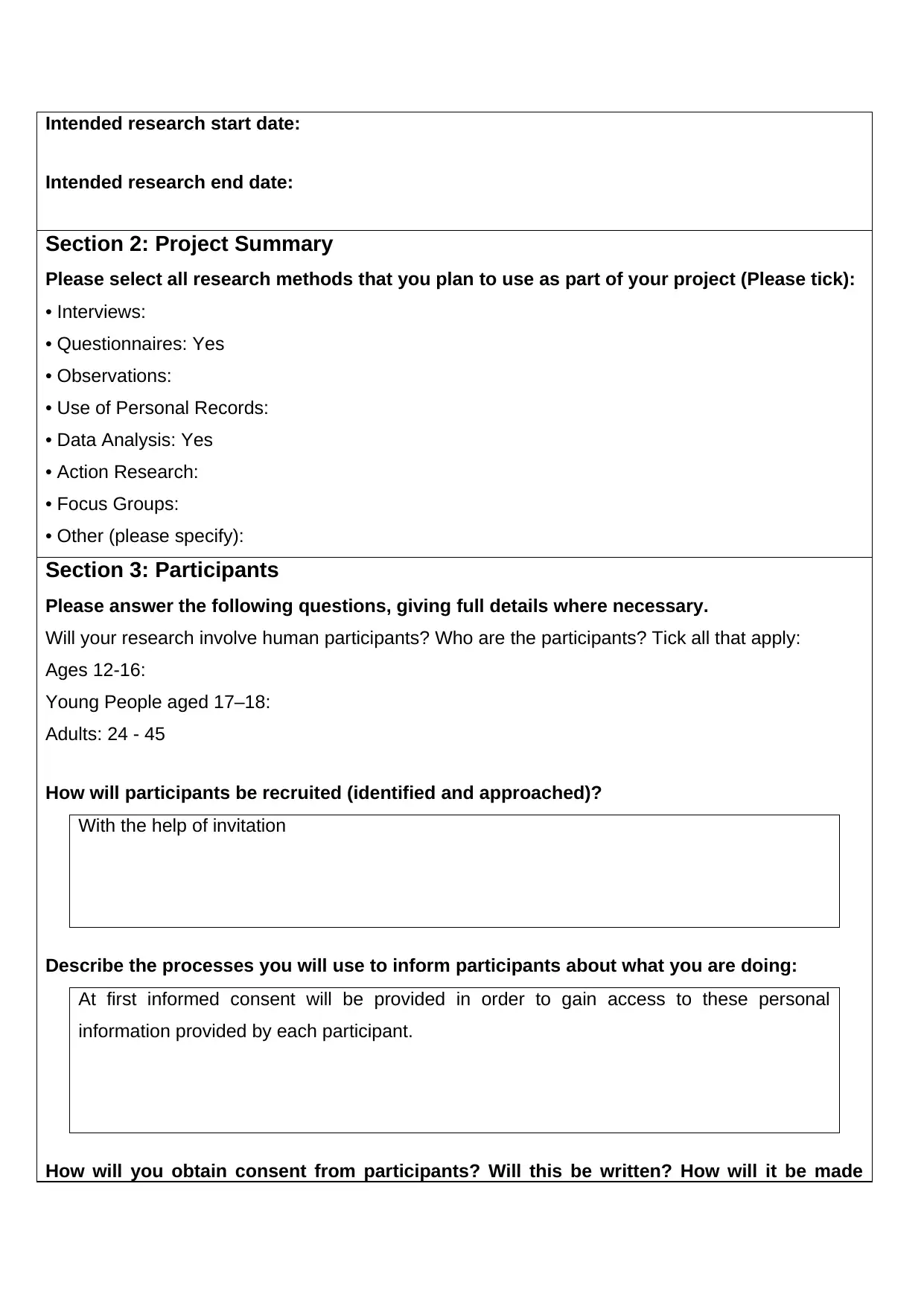
Intended research start date:
Intended research end date:
Section 2: Project Summary
Please select all research methods that you plan to use as part of your project (Please tick):
• Interviews:
• Questionnaires: Yes
• Observations:
• Use of Personal Records:
• Data Analysis: Yes
• Action Research:
• Focus Groups:
• Other (please specify):
Section 3: Participants
Please answer the following questions, giving full details where necessary.
Will your research involve human participants? Who are the participants? Tick all that apply:
Ages 12-16:
Young People aged 17–18:
Adults: 24 - 45
How will participants be recruited (identified and approached)?
With the help of invitation
Describe the processes you will use to inform participants about what you are doing:
At first informed consent will be provided in order to gain access to these personal
information provided by each participant.
How will you obtain consent from participants? Will this be written? How will it be made
Intended research end date:
Section 2: Project Summary
Please select all research methods that you plan to use as part of your project (Please tick):
• Interviews:
• Questionnaires: Yes
• Observations:
• Use of Personal Records:
• Data Analysis: Yes
• Action Research:
• Focus Groups:
• Other (please specify):
Section 3: Participants
Please answer the following questions, giving full details where necessary.
Will your research involve human participants? Who are the participants? Tick all that apply:
Ages 12-16:
Young People aged 17–18:
Adults: 24 - 45
How will participants be recruited (identified and approached)?
With the help of invitation
Describe the processes you will use to inform participants about what you are doing:
At first informed consent will be provided in order to gain access to these personal
information provided by each participant.
How will you obtain consent from participants? Will this be written? How will it be made
⊘ This is a preview!⊘
Do you want full access?
Subscribe today to unlock all pages.

Trusted by 1+ million students worldwide
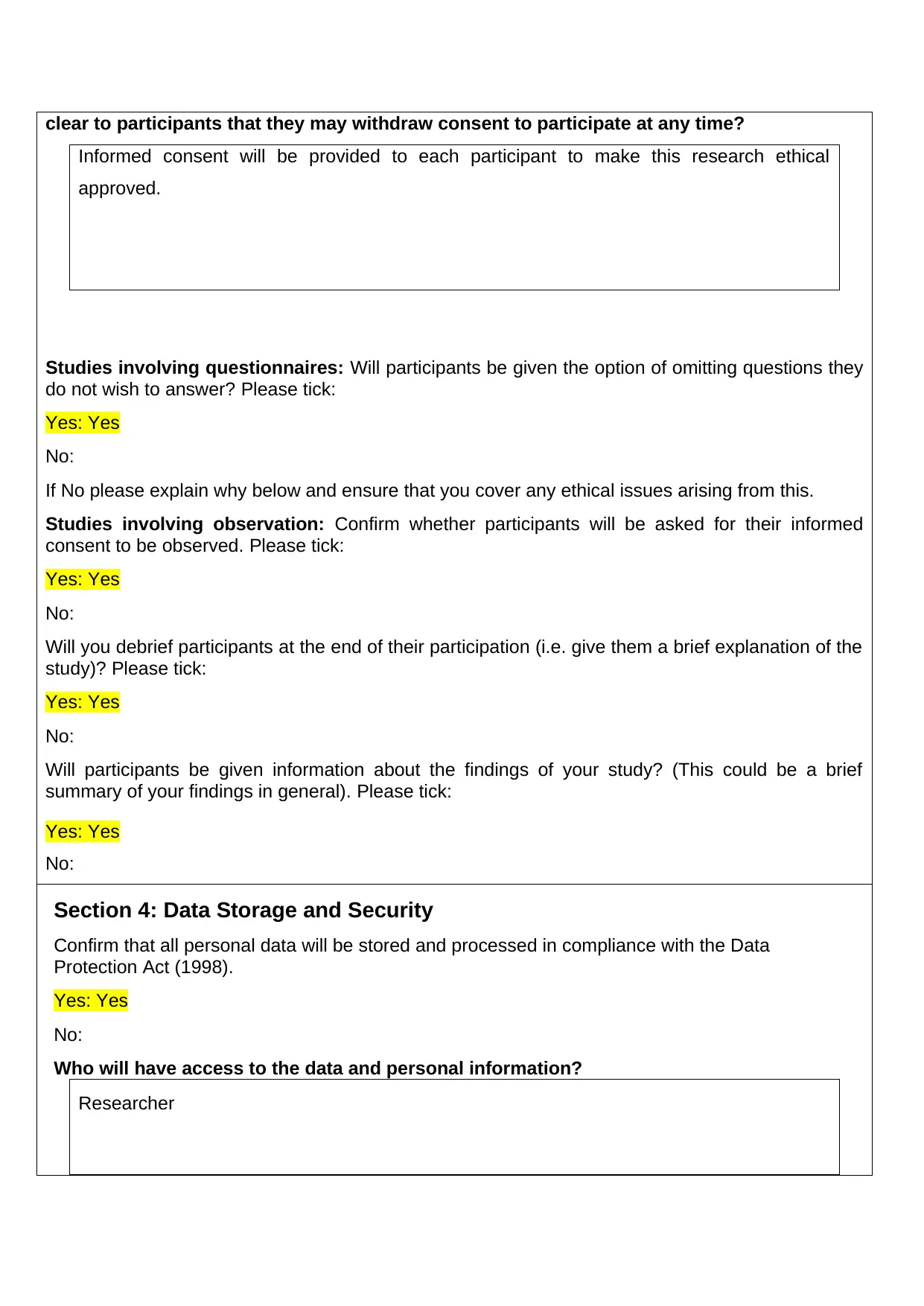
clear to participants that they may withdraw consent to participate at any time?
Informed consent will be provided to each participant to make this research ethical
approved.
Studies involving questionnaires: Will participants be given the option of omitting questions they
do not wish to answer? Please tick:
Yes: Yes
No:
If No please explain why below and ensure that you cover any ethical issues arising from this.
Studies involving observation: Confirm whether participants will be asked for their informed
consent to be observed. Please tick:
Yes: Yes
No:
Will you debrief participants at the end of their participation (i.e. give them a brief explanation of the
study)? Please tick:
Yes: Yes
No:
Will participants be given information about the findings of your study? (This could be a brief
summary of your findings in general). Please tick:
Yes: Yes
No:
Section 4: Data Storage and Security
Confirm that all personal data will be stored and processed in compliance with the Data
Protection Act (1998).
Yes: Yes
No:
Who will have access to the data and personal information?
Researcher
Informed consent will be provided to each participant to make this research ethical
approved.
Studies involving questionnaires: Will participants be given the option of omitting questions they
do not wish to answer? Please tick:
Yes: Yes
No:
If No please explain why below and ensure that you cover any ethical issues arising from this.
Studies involving observation: Confirm whether participants will be asked for their informed
consent to be observed. Please tick:
Yes: Yes
No:
Will you debrief participants at the end of their participation (i.e. give them a brief explanation of the
study)? Please tick:
Yes: Yes
No:
Will participants be given information about the findings of your study? (This could be a brief
summary of your findings in general). Please tick:
Yes: Yes
No:
Section 4: Data Storage and Security
Confirm that all personal data will be stored and processed in compliance with the Data
Protection Act (1998).
Yes: Yes
No:
Who will have access to the data and personal information?
Researcher
Paraphrase This Document
Need a fresh take? Get an instant paraphrase of this document with our AI Paraphraser
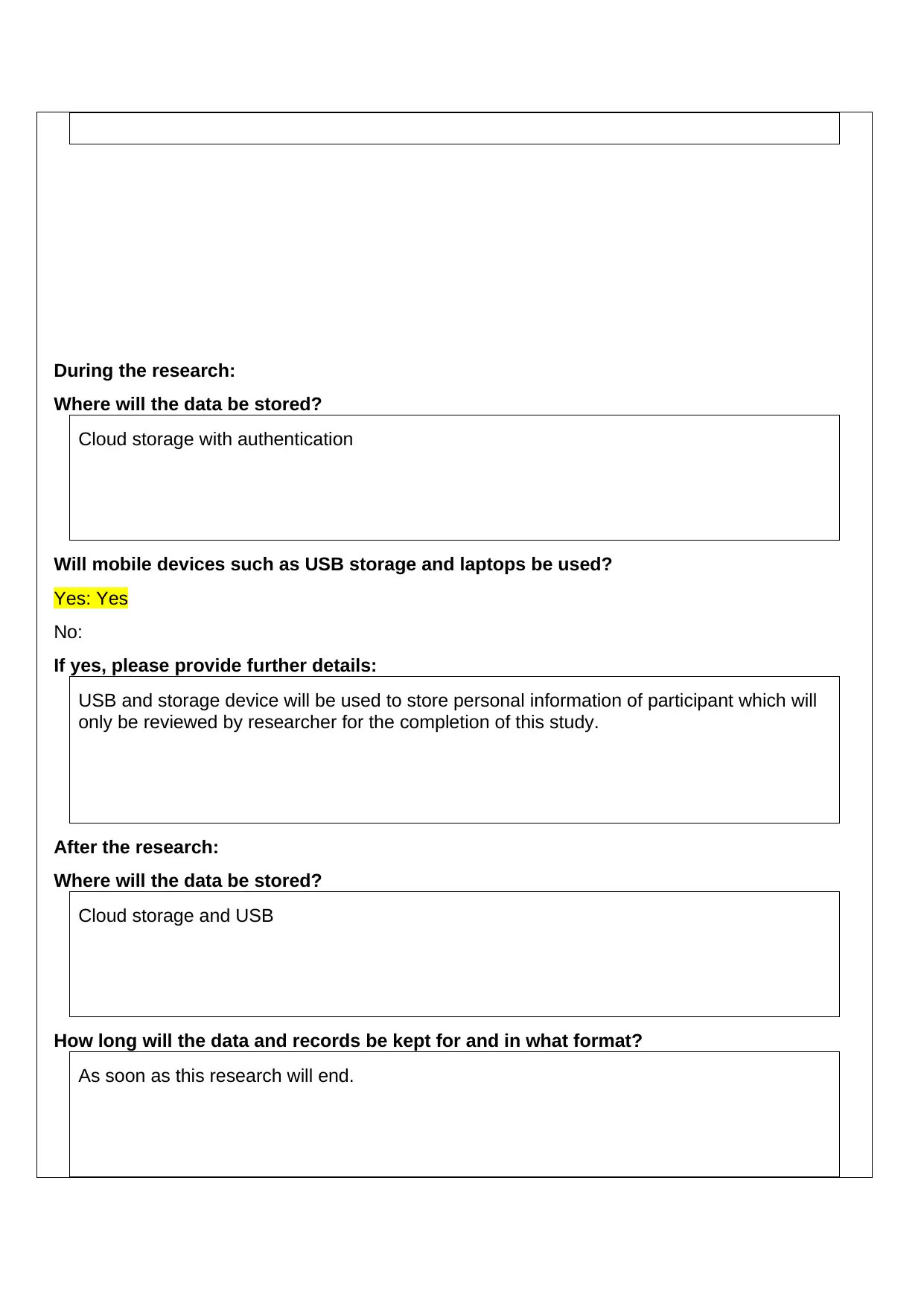
During the research:
Where will the data be stored?
Cloud storage with authentication
Will mobile devices such as USB storage and laptops be used?
Yes: Yes
No:
If yes, please provide further details:
USB and storage device will be used to store personal information of participant which will
only be reviewed by researcher for the completion of this study.
After the research:
Where will the data be stored?
Cloud storage and USB
How long will the data and records be kept for and in what format?
As soon as this research will end.
Where will the data be stored?
Cloud storage with authentication
Will mobile devices such as USB storage and laptops be used?
Yes: Yes
No:
If yes, please provide further details:
USB and storage device will be used to store personal information of participant which will
only be reviewed by researcher for the completion of this study.
After the research:
Where will the data be stored?
Cloud storage and USB
How long will the data and records be kept for and in what format?
As soon as this research will end.
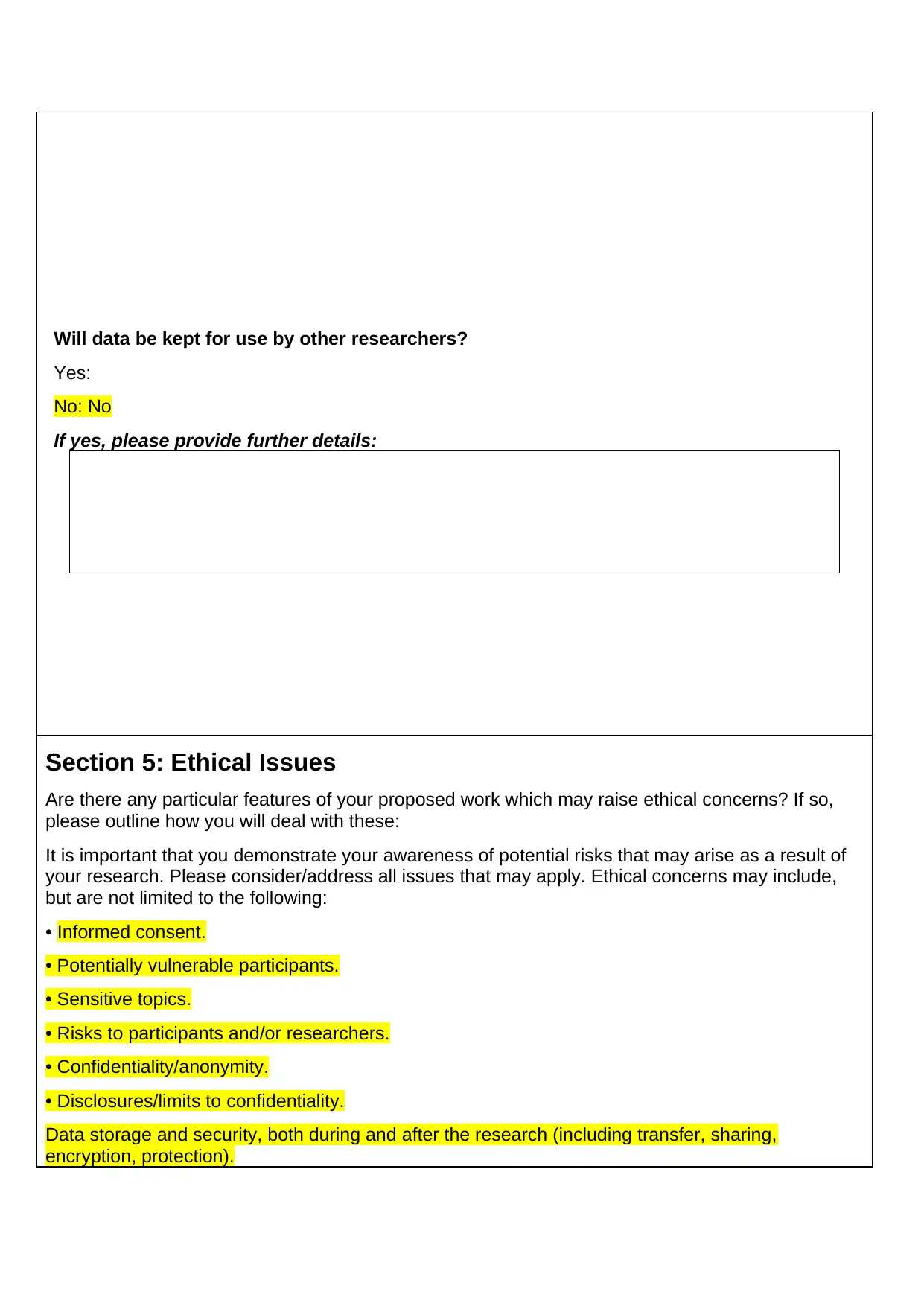
Will data be kept for use by other researchers?
Yes:
No: No
If yes, please provide further details:
Section 5: Ethical Issues
Are there any particular features of your proposed work which may raise ethical concerns? If so,
please outline how you will deal with these:
It is important that you demonstrate your awareness of potential risks that may arise as a result of
your research. Please consider/address all issues that may apply. Ethical concerns may include,
but are not limited to the following:
• Informed consent.
• Potentially vulnerable participants.
• Sensitive topics.
• Risks to participants and/or researchers.
• Confidentiality/anonymity.
• Disclosures/limits to confidentiality.
Data storage and security, both during and after the research (including transfer, sharing,
encryption, protection).
Yes:
No: No
If yes, please provide further details:
Section 5: Ethical Issues
Are there any particular features of your proposed work which may raise ethical concerns? If so,
please outline how you will deal with these:
It is important that you demonstrate your awareness of potential risks that may arise as a result of
your research. Please consider/address all issues that may apply. Ethical concerns may include,
but are not limited to the following:
• Informed consent.
• Potentially vulnerable participants.
• Sensitive topics.
• Risks to participants and/or researchers.
• Confidentiality/anonymity.
• Disclosures/limits to confidentiality.
Data storage and security, both during and after the research (including transfer, sharing,
encryption, protection).
⊘ This is a preview!⊘
Do you want full access?
Subscribe today to unlock all pages.

Trusted by 1+ million students worldwide
1 out of 13
Related Documents
Your All-in-One AI-Powered Toolkit for Academic Success.
+13062052269
info@desklib.com
Available 24*7 on WhatsApp / Email
![[object Object]](/_next/static/media/star-bottom.7253800d.svg)
Unlock your academic potential
Copyright © 2020–2026 A2Z Services. All Rights Reserved. Developed and managed by ZUCOL.




